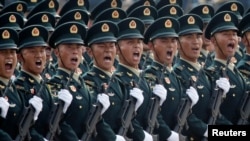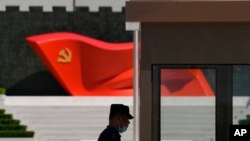"Good work style and capable of winning battles."
That's how House, a famous Chinese stand-up comedian, described his two adopted street dogs chasing squirrels at two performances in Beijing.
The audience burst into laughter because they, like the comedian whose real name is Li Haoshi, understood the origin of the phrase. It is a training requirement for the People's Liberation Army set forth by Xi Jinping, who is the president of China, the general secretary of the Communist Party of China and the chairman of the Central Military Commission, the highest governing body of China's army.
But one audience member was unamused and posted "this stupid stunt insulted the people's soldiers" on Weibo, China's version of Twitter.
The incident blew up, breaking China's walled-off version of the internet and making headlines.
On Wednesday, after an investigation of the May 13 performances, the Beijing Municipal Culture Bureau found Li's joke to be a "serious insult to the people's army." Authorities imposed a fine of $1.9 million, confiscated nearly $190,000 from ticket sales for May 13, and ordered Li and his company, Shanghai Xiaoguo Culture Media, to suspend their performances indefinitely.
As a result, it appears Li may no longer have a career in comedy, and Shanghai Xiaoguo Culture Media, with an estimated worth of $570 million from hosting popular stand-up comedy performances, may lose its market.
Costly quip
Stand-up comedy was introduced to China a little over 10 years ago. By 2017, celebrated comedians and large audiences led broadcasters to air comedy shows such as Roast! and Rock and Roast.
But like other aspects of China's entertainment industry, stand-up has increasingly come under government censorship and in some cases, such as the patriotic "Wolf Warrior" movies, has been fashioned to reinforce Xi's vision for a nation that is second to none.
Most Chinese netizens agreed with the official disposition of the House case on Weibo, which operates under a stringent censoring system that allows users to report content they consider inappropriate. They posted that the "punishment is light" or "he should be prosecuted for criminal responsibility."
One netizen from Guangdong province posted, "We can do without stand-up comedians, but not without people's soldiers!"
Another netizen called for banning the genre: "The stand-up comedy should be shut down entirely. It's full of a bunch of uneducated and unethical and thoughtless people."
Other netizens, especially comedy fans, expressed anger and outrage at the official response to a joke.
Mr. Wei, the pseudonym used by the person who first objected to the performance, claims he's been trolled and threatened with online violence. He also said he received private messages from comedy lovers, according to a Thursday report from China Newsweek.
On WeChat, another widely used social media platform, many users posted an old interview video clip of Chen Peisi, one of China's most famous comedians known for sharp satire since he entered the spotlight in the 1980s.
"Let's never go back to the era when people don't know how to laugh," he said in a 2021 interview. WeChat deleted the clip many users had posted to express their anger and dissatisfaction with the House ruling.
Li Xiaolu, a renowned young actor, said on her Weibo page, "He who has a mind to beat his dog will easily find his stick," implying the authorities could always find excuses to punish comics.
Hu Xijin, an influential former editor-in-chief of the official Global Times famed for his nationalist viewpoint, posted on his Weibo page, "Has the honor of the People's Liberation Army been challenged? I don't think so."
Chilling effect
The entertainment industry has remained silent aside from apologies from House and his company.
VOA Mandarin tried to contact Chinese stand-up comedians through Weibo to get their comments. None have responded and none have posted on Weibo over the past few days.
A human rights lawyer in China, who asked not to be named because of the sensitivity of the issue, told VOA Mandarin that the case left him speechless. "This has nothing to do with the law. It's just an escalated, new Cultural Revolution movement in China."
LeLe Farley, a Los Angeles-based comedian who spent years in China and speaks fluent Chinese, said in an interview with VOA Mandarin during a video interview that the chilling effect of the official response has silenced Chinese comedians, even those who may be outraged.
"The scariest thing of the Communist Party is that as soon as it punishes stand-up comedians like House, other comedians will actively engage in what they call self-censorship," said Farley, who has been banned in China. "I think this [environment] has become very difficult, unless you only value money and fame. You'd definitely be depressed if you are an entertainer or artist."
Farley said he thinks punishing House for his joke is "ridiculous" but not surprising because the government has gradually been tightening its control over the entertainment industry.
Comedians' responsibility
In an interview with VOA Mandarin, Hauer Hsieh, co-founder of the Taipei-based comedy production company, STR Network, said, "Comedy, at least some of it, is based on challenging the limits of society and offending others. Performers may offend others, and others may disagree with you and may even want to attack you."
Hsieh said that everyone's acceptance of jokes is different, and as comedians must realize, the audience has the right to complain or boo, but it is unreasonable to interfere with the way the show is performed. He cited the example of a person who likes to listen to light music but goes to a loud concert.
"He can complain privately or leave because if he doesn't like it, but he has no right to ask the organizers to change the way the show is performed. For such civil disagreements, the public authority should not interfere at all."








